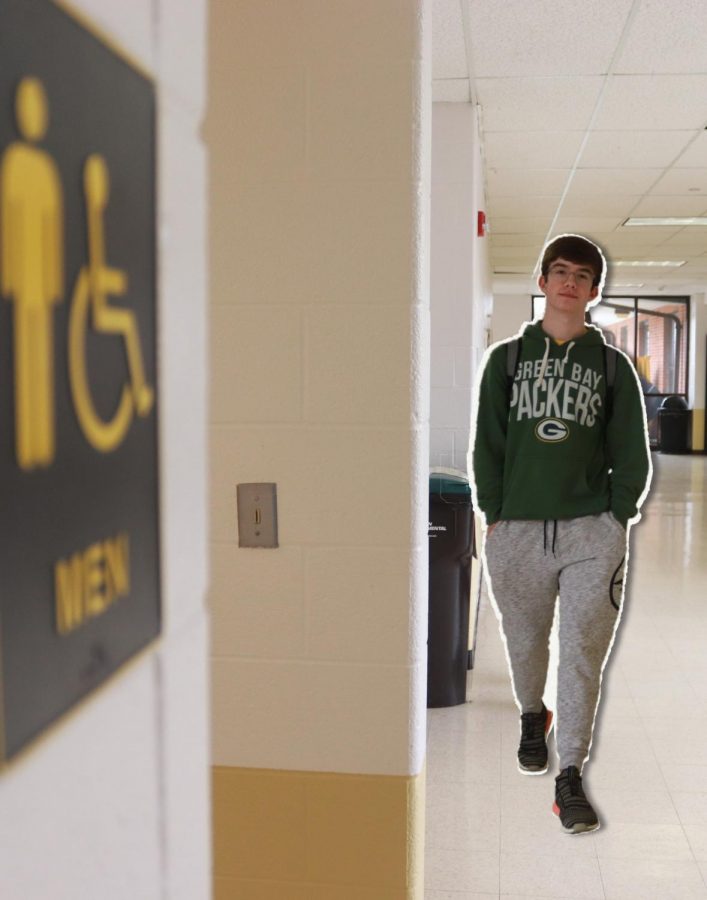Your donation will support the student journalists of Francis Howell North High School. Your contribution will allow us to purchase equipment and cover our annual website hosting costs.
Credit to Francisco Jiminez
Chronic Illness, Chronic Disruption
Published: April 3, 2019
After a restless night of getting up to use the restroom, sophomore Marcus Otto knows it’s going to be a bad day. He’s experiencing severe stomach cramps, vomiting, trips to the bathroom and the inability to eat. These days can vary in occurrence, from twice a month to a consecutive week. Having gone through a bad day like this before, Otto realizes he has to stay home from school.
Otto has Crohn’s disease, a chronic illness which affects the lining of the digestive tract. The immune system views the bacteria in the stomach and lining of the intestines as foreign and can cause a multitude of symptoms, including cramps, pain in the abdomen, bloating or nausea. Otto was first diagnosed when he was in seventh grade, when stomach pain and muscle aches drove him to seeing a doctor. After 12 months, three doctors visits, multiple tests and a cancer scare, a gastroenterologist determined that he had Crohn’s disease.
“I was happy that it wasn’t cancer at first,” Otto said. “When I started doing research, I realized that there is no cure and that it’s never going to go away. So, that kind of bummed me out. You know, you get the medicine to treat it and it treats it fairly well, but it’s going to be there forever and it’s never going to go away.”
Chronic illness is a disease or illness that is recurring or permanent. Examples of chronic illnesses include cerebral palsy, autoimmune disorders, cancer, epilepsy and obesity. There are also a variety of developmental and learning disorders, like ADHD and bipolar disorder, that are considered chronic illnesses. According to the U.S. Department of Health and Human Services, almost one in three adolescents ages 12 to 17 had at least one chronic health condition in 2011 to 2012. These conditions could potentially affect their schoolwork.
“It could impact attendance, of course, if they need care within the school day,” counselor Lisa Woodrum said. “Even if they’re maintaining [their health] a little bit and they can do school, oftentimes those appointments would be during the school day. For a chronic illness, the impact on learning can be significant based on the coping skills of a person. We know that, whether you’re an adult or a teenager, if you have a really nice support system, you might be able to handle more. But sometimes, if people don’t have a support system, or maybe their coping skills don’t match their chronic illness, then we know that the learning new concepts, application of those concepts, we know that there could be a delay [in learning].”
Not only is attendance and grades impacted, but social interaction between peers could be at risk. When Otto was first diagnosed, he was missing a lot of school, therefore impacting his attendance, grades and interaction with others. There are many necessary advantages to teenage socialization, including a sense of belonging, a way to experiment with new ideas and values and a feeling of being valued, which helps with confidence. If a student is absent due to chronic illness, they could be missing out on these important steps in socialization.
“If a student is not able to be at school full time, that would be really hard and it is hard for those people, especially when you’re supposed to be social and young and learning all kinds of information and skills about peer relations,” Woodrum said. “It does have a negative impact [on their social life] sometimes and on their learning, because as humans we are social beings. So, if you don’t have somebody to talk about that science concept with or kind of commiserate and say ‘I really did not understand what they wanted on this essay,’ then that definitely not only affects their health, but it also impacts their ability to learn.”
The percentage of chronic illnesses in children is steadily increasing, according to the American Academy of Pediatrics, although it is unclear if it is due to an increase in the prevalence of chronic illnesses, improvements of diagnostic criteria or a combination of both. Schools are having to figure out solutions to help the kids affected by these illnesses. One solution at FHN is a master pass, written by the school nurse and excuses the student from any class if they need to see the nurse, use the bathroom or for any other reason pertaining to their illness. Another solution is the Homebound academic plan for students who cannot physically come to school. Homebound instructors visit with the students for five hours a week either at home or a library to give the student their work and offer any help. There are different variations of this plan where some can come in for a partial day, depending on what works best for them and their illness.
“The schools are trying to be as accommodating as they can so the person can have the most out of the education,” school nurse Brooke Magilligan said. “We try to help give supports to help them because they can’t help the fact that they have this chronic illness.”

